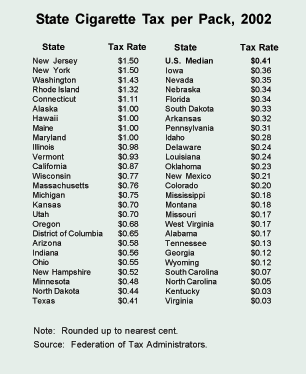Diverse state tobacco taxes are a key reason for cigarette smuggling, in which organized crime and terrorist groups increasingly are involved. A July 21 article in the Detroit News quoted John D'Angelo of the Bureau of Alcohol, Tobacco and Firearms (ATF) as saying, "There is no doubt that there's a direct relationship between the increase in a state's tax and an increase in illegal trafficking."
The Profit in Smuggling.
According to the Federation of Tax Administrators, so far this year 17 states have raised their cigarette taxes in an effort to cover their budget deficits. The magnitude of the increases is remarkable.
- On January 1, 2002, the median state cigarette tax rate was 34 cents per pack and the average was 45 cents.
- six months, the median rose to 41 cents and the average to 54 cents.
- By contrast, 10 years ago both the median and average were 25 cents.
New York and New Jersey have the highest state tax rates, $1.50 per pack. New York City imposes an additional tax of $1.50, for a total tax of $3.00 per pack. At the other end of the spectrum, North Carolina's tax is just 5 cents per pack, Kentucky's is 3 cents and Virginia's is 2.5 cents. [See Figure I.] 
It is easy to buy a truckload of cigarettes in North Carolina and sell them in New York City for a profit of almost $30 per carton. Thus a few hours' "work" can yield several thousand dollars' profit.
Every day, residents of Maryland ($1 tax) and the District of Columbia (65 cents tax) technically engage in smuggling by buying cigarettes in Virginia. Although interstate cigarette smuggling is a crime, prosecutions are rare.
The Role of Organized Crime and Terrorism.
On June 1, the Washington Post reported that Maryland's cigarette tax increase from 66 cents to $1 led to an immediate jump in smuggling. It said that "a vast and burgeoning underworld of criminals" is now engaged in the business: "Criminals who once dealt exclusively in illegal drugs are now smuggling cigarettes because it is so lucrative and punishments generally are much less severe."
For years, police have warned of organized crime's move into cigarette smuggling. The criminal gangs have brought experience from the drug trade, economies of scale and other efficiencies to cigarette smuggling. For example, they can counterfeit tax stamps, something small-time smugglers cannot do.
Terrorists, too, are smuggling cigarettes to finance their operations – not surprising since they are tightly organized, highly disciplined and experienced in smuggling weapons and explosives. A March 10 San Francisco Chronicle story entitled "Terrorists Mimic Crime Syndicates to Fund Attacks" detailed the involvement of many groups in smuggling. "More and more, terrorists are acting like traditional organized crime groups, engaging in rackets like cigarette and fuel smuggling," the Chronicle reported. Indeed, it said terrorists are working alongside organized crime.
The Irish Republican Army has long been implicated in cigarette smuggling in Europe. Recently, a member of Hezbollah was convicted of running a multimillion-dollar smuggling operation out of North Carolina. The Washington Post quoted Maryland State Comptroller William Donald Schaefer as saying, "We know that some of the money used by smugglers is directly passed on to terrorist organizations."
On September 28, the Los Angeles Times reported that federal authorities have been probing western New York for evidence of cigarette smuggling as a source of Al Qaeda funding. One smuggling scheme involving several local Arab Americans was broken up in 1999, said the Times.
Smuggling via the Internet.
The Internet simplifies smuggling. Cigarettes from Indian reservations, where state cigarette taxes are not collected, are often available online. The purchaser pays by credit card, and the cigarettes are delivered to his or her home.
The Jenkins Act requires vendors to report to the buyer's state tobacco tax administrator when cigarettes are sold across state lines. However, many Internet vendors do not report the sales. An August 9 General Accounting Office report concluded that transferring primary investigative jurisdiction from the Federal Bureau of Investigation (FBI) to the ATF would give the latter comprehensive authority to enforce the Jenkins Act and should result in better enforcement.
Adding Jenkins Act enforcement responsibility to its authority under the Contraband Cigarette Trafficking Act may increase the likelihood that the ATF will detect and investigate violators and that U.S. attorneys will prosecute them. Yet so long as tobacco products are legal and state cigarette taxes are divergent, the ATF can do only so much. The authorities cannot even keep cigarettes from being smuggled into prisons.
Consequences of High Tobacco Taxes.
The growth of cigarette smuggling is a key reason why cigarette tax revenues are not keeping pace with tax increases. Between 1992 and 2000, the average state cigarette tax rate increased 64 percent while gross state tax revenues rose only 35 percent. [See Figure II.] The apparent fall in smoking rates over this period was not nearly enough to account for the revenue shortfall. This suggests that states expecting higher revenues from recent cigarette tax increases may never see them.
Even liberal groups like the Center for Budget and Policy Priorities (CBPP) now warn states against expecting too much revenue from higher cigarette taxes. The CBPP also is concerned that the poor, who smoke in higher numbers, may be unduly burdened. It suggests a tax rebate to low-income smokers. Of course that would only make it easier for them to afford cigarettes.
Another problem is that as cigarette distribution moves out of normal outlets and into criminal channels, controls on cigarette purchases by minors erode. Not only does this potentially increase smoking by teen-agers, but it brings more of them into contact with dealers pushing stronger drugs.
As much as politicians and antismoking zealots hate to admit it, there are limits to how much states can tax tobacco. At some point, they may have to admit that high cigarette taxes are even more harmful than smoking.
Bruce Bartlett is a senior fellow with the National Center for Policy Analysis.